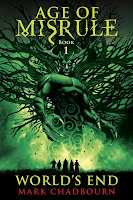SF Signal is back with another one of their “Mind Meld” round tables, this one on the future of written science fiction. The respondents this time around include Jeff VanderMeer, Liz Williams, Allen Steele, Mark Newton, Jay Lake, Elizabeth Bear, Paul Di Filippo, Sean Williams, Chris Roberson, Dot Lin, Alexis Glynn Latner, and Yours Truly.
I particularly liked Jeff Vandermeer’s assertion that:
“…the real challenge is writing near future SF. Stross I believe said near future sf is impossible. I respectfully say that is bullshit. To be relevant that is exactly what SF needs and how SF is falling down on the job right now. SF can do escapism just fine right now. But dealing with things head on? Not so well. SF has to get down in the nitty gritty of the horrible position we are in right now or it runs the risk of being just as irrelevant as the next medieval based fantasy trilogy. Yes it is hard to do. Who ever said writing was supposed to be easy? Show some guts.”
And I particularly liked Chris Roberson’s exact opposite reaction:
“I’d love to see more people playing what Rudy Rucker calls the ‘power chords’ of science fiction. He describes these as ‘those classic SF topes that have the visceral punch of heavy musical riffs.’ The list includes: Blaster guns, spaceships, time machines, aliens, telepathy, flying saucers, warped space, faster-than-light travel, immersive virtual realities, clones, robots, teleportation, alien-controlled pod people, endless shrinking, the shattering of planet Earth, intelligent goo, antigravity, generation starships, ecodisaster, pleasure-center zappers, alternate universes, nanomachines, mind viruses, higher dimensions, a cosmic computation that generates our reality and, of course, the attack of the giant ants. I want more of that stuff. The good stuff, the fun stuff. The mind-expanding thought-experiments and heady adventure stories.”
And I loved Jay Lake’s analogy, which explains how I can reconcile both of the above:
“Literature is like rock and roll…new movements come along, but the old ones never die. Reader tastes change, writers and publishers adapt, or they don’t. I for one hope to keep writing what I love, and keep adapting at the same time.”
Amen.
 Tor.com has just uploaded my conversation with James Enge, author of the just-released Swords & Sorcery novel, Blood of Ambrose.
Tor.com has just uploaded my conversation with James Enge, author of the just-released Swords & Sorcery novel, Blood of Ambrose.I’m fascinated by Enge’s world building, and his views on fantasy fiction in general. Check out the whole post, but here’s a taste:





